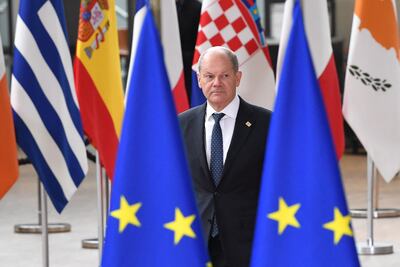Live updates: follow the latest news on Russia-Ukraine
Germany's government and conservative opposition have agreed on a deal that will release €100 billion ($107bn) to modernise its army in the face of the Russian threat.
An agreement was reached late on Sunday for a special military procurement fund that will also allow Berlin to achieve Nato's target of spending 2 per cent of GDP on defence.
The deal, which involves amending budgetary rules in the national constitution, was struck after weeks of talks between the parties in the governing coalition and the conservatives of former chancellor Angela Merkel, representatives told AFP.
Three days after the Russian invasion of Ukraine in February, Chancellor Olaf Scholz pledged a special budget of €100bn to rearm the German military and modernise its outdated equipment over the next few years.
But critics have since accused Mr Scholz of timidity in his support for Kyiv and failing to take enough concrete action in arms deliveries.
The agreement will allow Berlin to achieve Nato's spending target "on average over several years", said a copy of the agreement obtained by AFP.
Mr Scholz told German regional dailies that the agreement would "considerably strengthen" the security of Germany and its Nato allies.

"Germany will soon have the largest conventional army in Europe within Nato," he said.
The exceptional fund will be financed by additional debt.
For that it was necessary to circumvent the "debt brake" rule enshrined in the constitution, which caps government borrowing.
This was why the government needed the support of the conservative opposition for a two thirds majority in parliament needed to pass the constitutional amendment.
The €100bn will be paid into a special fund outside the national budget.

Release of the funds for the military is a major reversal for Germany, which in recent years has delayed complying with Nato spending commitments, drawing criticism from Washington in particular.
Since the end of the Cold War, Germany has significantly reduced the size of its army, from about 500,000 troops in 1990 to 200,000 today.
Fewer than 30 per cent of German naval ships were "fully operational", according to a report published December on the state of the military. Many of the country's fighter aircraft are unfit to fly.
But the invasion of Ukraine has jolted into action a country steeped in pacifism since the horrors of the Nazi era.


